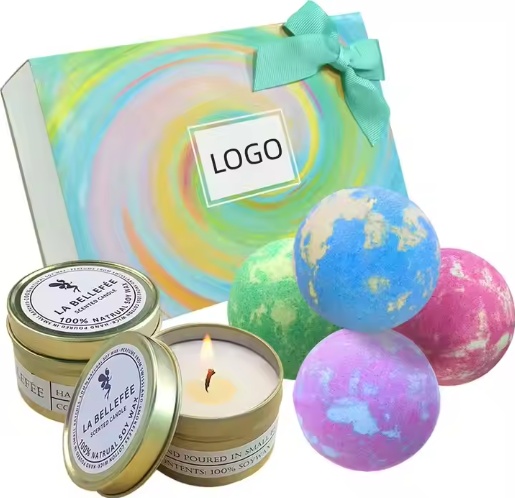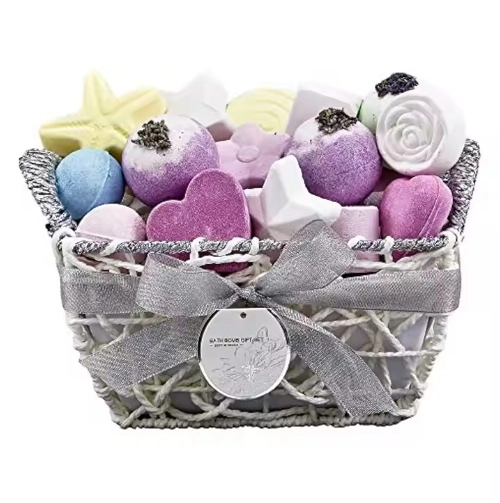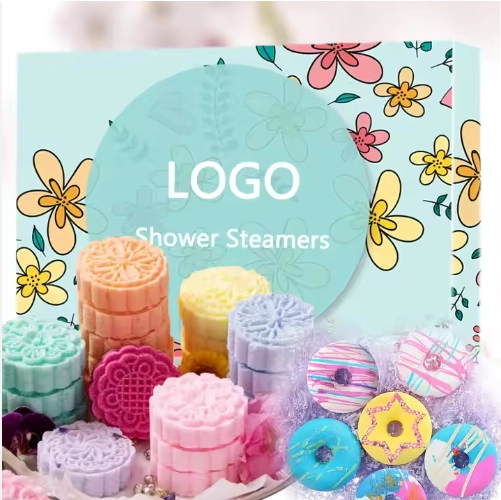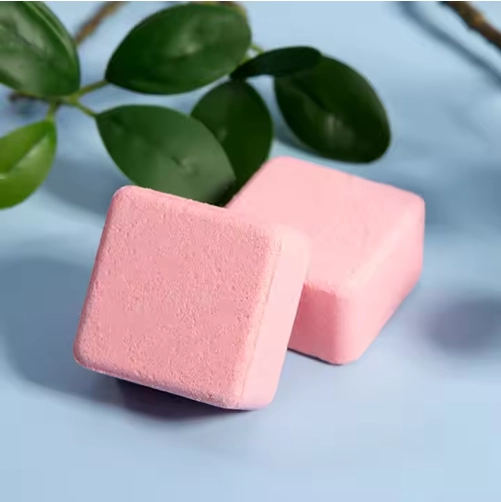How Does Bath Bomb Work?
The “bomb” aspect of a bath bomb is the fizziness. But what’s going on in those spheres that make them so fizzy? Two of the key ingredients to a bath bomb are citric acid and sodium bicarbonate. You might also know sodium bicarbonate by its more common name, baking soda. These two ingredients are what cause the impressive and delightful fizz when the bath bomb enters the water.
When sodium bicarbonate (NaHCO3) comes in contact with water, the sodium (Na) molecules break off from the bicarbonate (HCO3). At the same time, the citric acid is dissolving, with a single hydrogen ion (H+) separating from the rest of the molecule. Another reaction happens when the released hydrogen ion from the citric acid encounters the bicarbonate from the baking soda! This time, carbon dioxide (CO2) gas is released as one of the end products. The carbon dioxide forms bubbles in the soap and bath water and rushes to the surface with a delightful fizz.
Do Bath Bombs Expire?
As with food products, bath bombs have ingredients with an expiration date and a recommended shelf life. The shelf life of bath bombs refers to how long they can be stored without losing their full effectiveness. An average bath bomb has an average shelf life of about six months.
Common bath bomb ingredients include citric acid and sodium bicarbonate (baking soda). While baking soda and citric acid both have long shelf lives, citric acid starts losing its potency as time passes. However, you can easily preserve the potency of the citric acid by storing it in a tightly sealed container.
When exposed to water or moisture, bath bombs tend to create an acid-base reaction. If they are exposed too much to the moisture in the air, they might not fizz anymore and begin to lose their effective properties.
The fresher your bath bomb is, the faster it fizzs and the better it works. You can utilize tight bulk bath bomb containers to store your fizzies for a long time, and they'll still be usable, but they cannot work effectively as compared to fresh ones.
Bath bombs should be stored in cool and dry places, such as basements or cupboards. If you like them in a humid environment, you can ensure they are properly stored with a dehumidifier.
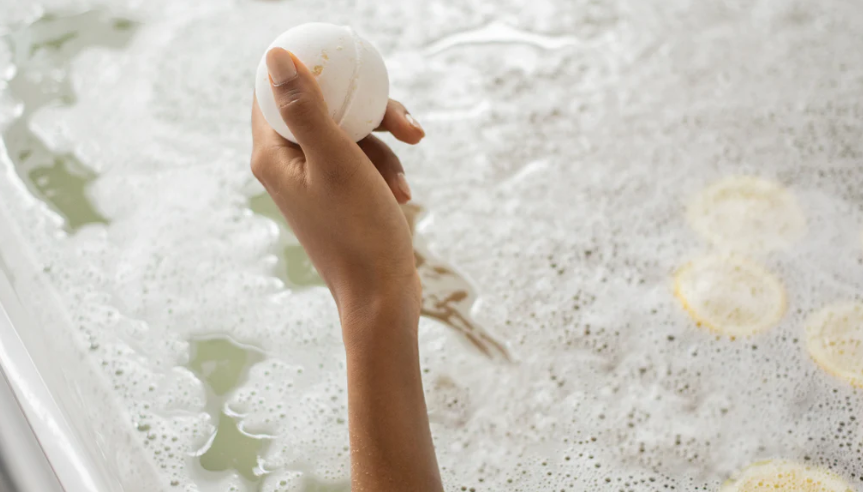
How Long Do Bath Bomb Ingredients Last?
While storing bath bombs in a bathroom cupboard seems sensible, you should also consider that they will be exposed to moisture and steam.
Since bath bombs contain a variety of fresh ingredients, this type of exposure can affect their longevity, which could reduce the shelf life of the package.
The usual shelf life for some of the ingredients used in bath bombs is as follows:
Essential Oils: Anywhere between 1-8 years depending on storage conditions and usage.
Carrier oils: Usually 1-2 years, depending on the usage and storage.
Baking soda: 6 months for an opened package, 2 years for an unopened package.
Citric acid: 3 years for an opened package, 5+ years for an unopened package.
Cornstarch: Almost indefinite, provided it is stored correctly.
Epsom salt: Indefinite, provided correct storage instructions are followed.
Signs that a bath bomb has expired
While bath bombs don’t have a clear expiration date, there are some signs that they may have passed their prime. One of the most noticeable signs is a change in color or scent. If a bath bomb has lost its vibrant color or its scent has significantly faded, it may be an indication that it’s no longer at its best. However, it’s important to note that these changes can also occur naturally over time, even if the bath bomb is still usable.
Another sign to watch out for is the texture of the bath bomb. If it feels unusually soft or crumbles easily, it may have lost its effectiveness. Bath bombs should have a firm texture that holds its shape until it comes into contact with water. If it falls apart easily or feels mushy, it’s a good indication that it has expired.
If you notice mould or discolouration on the bath bomb, discard it immediately. Mould growth can be harmful to your skin, and using a mouldy bath bomb can lead to skin irritation or infections. Always prioritize your safety and avoid using bath bombs that show signs of mould or discolouration.
Can You Extend The Shelf Life of a Bath Bomb?
When it comes to storage, you can do a few things to extend the shelf life of a bath bomb.
Use a location that is cool and dry
If you have experience with essential oils, you can follow the same basic principles for storage. Keep your prepared bath bombs in cool and dry spaces away from direct sources of heat and water.
Cupboards and drawers are recommended, as items placed there have a better chance of maintaining a balanced temperature. Heat can also harm the citric acid and baking soda, reducing their effectiveness the hotter the bath bomb becomes.
Lock out moisture and oxygen
When storing your bath bombs in a cupboard or drawer, you should also keep them in airtight Ziploc bags or sealed plastic containers. This helps to reduce exposure to oxygen and moisture, both of which can damage the integrity of the ingredients.
Keep similar scents together
Storing bath bombs with similar scents together will help them maintain their original fragrances. The opposite is also true. So, for example, if you were to store a lavender-infused bath bomb with a citrus-infused bath bomb in a sealed bag, the scents would intermingle and affect each other, creating a new fragrance that may smell different or a little strange.
Can You Use Expired Bath Bombs?
No damage is done by using old bath bombs. A product’s expiration date does not automatically equate to harmful status. Try old bath bombs if you’d like. Don't get your hopes up if you accidentally drop it in the tub. The older a bath bomb is, the less potency it has, as previously indicated. Bath bombs frequently stop fizzing after six months. They may, nevertheless, still emit nice odours. When a bath bomb expires, don’t immediately throw it away. Instead, give it a try and see if you like it.
What Happens If You Use An Expired Bath Bomb?
Nothing. Literally, nothing will happen.
It’s not harmful.
But apart from maybe coloring your bath water, if your bath bomb has added color, you will not get the fizz, the nice smells, or basically any of the benefits you put the bomb into your bath to get.
Don’t forget that all those skin-soothing and hydrating oils in your bath bomb have an expiry date, too.
Previous
Do CBD Bath Bombs Really Work?Send Inquiry

